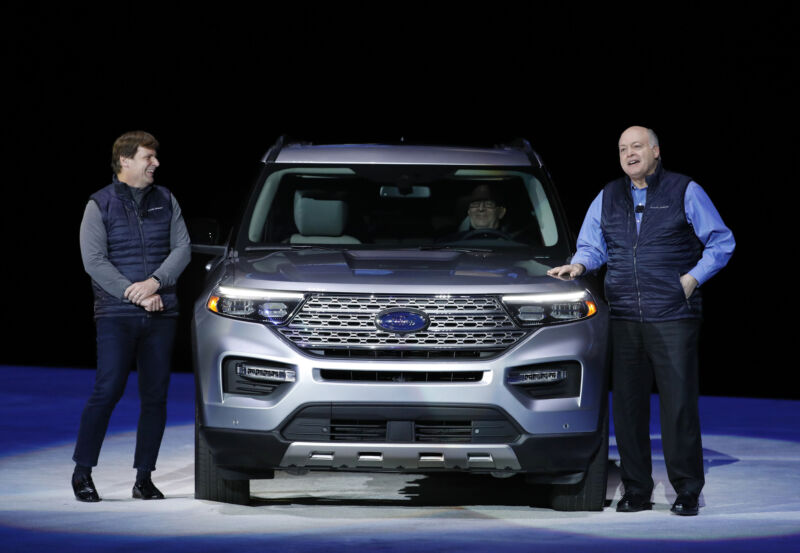
Ford has changed CEOs for the third time in six years, the company announced on Tuesday. Current CEO Jim Hackett will step down in October and be succeeded by his handpicked deputy, Chief Operating Officer Jim Farley.
Hackett made some significant changes to try to make Ford more profitable. Most dramatically, Hackett cancelled most of Ford's car lineup in the US so the company can focus on its more profitable trucks and SUVs. Ford then announced plans for $11 billion in new investments in electric and hybrid vehicles—even as it laid off almost 20 percent of its European workforce.
"We made some significant decisions in the earliest days that were quite controversial," Hackett said on a Tuesday conference call. "Getting out of the sedan business was a difficult question."
Some have argued that Hackett was pushed out of Ford due to the company's lackluster performance—Ford's stock price is down about 40 percent since the start of Hackett's tenure. But others argue that Hackett simply wasn't interested in being in the top job for a long time. Hackett, now 65, joined Ford near the end of a long career. His plan may have always been to chart a new course and identify a promising successor before passing the torch.
"Hackett was always a short-termer, there to fight the fires [former CEO Mark] Fields lit," wrote car industry reporter Dan Carney in a Tuesday tweet. "With those largely extinguished and Farley having proved himself, he understandably wants to go back to the retirement from which Ford pulled him."
New products and technologies
The fruits of Hackett's shift toward trucks and electrification began appearing in the last year. In November, Ford announced a long-range battery electric vehicle called the Mustang Mach-E. In June, Ford gave its F-150 truck line a makeover, adding a hybrid option. The company also brought back the Bronco after a 24-year hiatus—though the Bronco was conspicuous for not having a hybrid or battery electric option.
Hackett took over Ford shortly after the car company made a billion-dollar bet on the self-driving startup Argo, and there have been no big changes in Ford's self-driving strategy since then. Since 2016, Ford's goal has been to offer a self-driving car without a steering wheel by 2021. Ford later modified the goal to have Argo launch a self-driving taxi service in 2021—a date that has now been pushed back to 2022.
Hackett's self-driving strategy won a vote of confidence last year when Volkswagen agreed to buy half of Ford's stake in Argo, deepening an existing alliance between Ford and Volkswagen. There are also plans for Ford to build some of its vehicles on top of Volkswagen's electric vehicle platform.
So Hackett has made significant investments in electrification and self-driving technologies, but he hasn't exactly bet the company on these shifts. Under Hackett, Ford continued to rely heavily on mainstays like the F-150.
Wall Street hasn't been impressed. The company's stock has lost about 40 percent of its value since Hackett took over in 2017. And that was on top of stock-price declines under Hackett's predecessor, Mark Fields.
Farley spent 17 years at Toyota before 13 at Ford
Farley's career in the automotive business began at Toyota, where he was involved with the launch of the Lexus brand in the early 1990s. He worked there for close to 20 years before being recruited to Ford in 2007—just as the Great Recession started to hit auto sales. At the time, Toyota was doing better than Ford and other Detroit automakers. Then-CEO Alan Mulally specifically recruited Farley to bring an outsider's perspective to Ford's management.
Over the last 13 years, Farley has risen through the ranks. Before his elevation to COO in February, Farley had focused on Ford's mobility and autonomous vehicle efforts—just as Hackett had overseen a Ford ride-sharing subsidiary before he got elevated to the top job. At the time that Farley was promoted to COO, Hackett dismissed questions about whether he was grooming Farley to be his successor, insisting that "I plan on staying in this job."
Now Hackett says he's changed his mind—he's been so impressed with Farley's work that he's decided that now is a good time to retire. Hackett said Tuesday that he's been dazzled with how Farley has managed the COVID crisis.
"A company like Ford has so much fixed cost, that when you turn those off, there's almost no way to avoid the kind of losses we were likely to face," Hackett said. "We were able to carve back a lot of the losses in a very short time, which is a statement to his management prowess and his grasp of the business."
Hackett portrayed his retirement as his own decision.
"It hit me probably in the spring if you ask the question, when is the right time to retire?" Hackett said. "I said you ought to do it now because the wind in our sails is really starting to pick up."
Of course, it's also possible that the board pushed Hackett out the door. At the same time, the board's choice to elevate Farley rather than looking for an outsider suggests that it isn't seeking a fundamental rethink of Hackett's strategy. Chairman Bill Ford showered Hackett with praise in the Tuesday conference call.
Business - Latest - Google News
August 05, 2020 at 04:41AM
https://ift.tt/3ftcvPr
Ford CEO surprises everyone by retiring after just three years - Ars Technica
Business - Latest - Google News
https://ift.tt/2Rx7A4Y
Bagikan Berita Ini















0 Response to "Ford CEO surprises everyone by retiring after just three years - Ars Technica"
Post a Comment